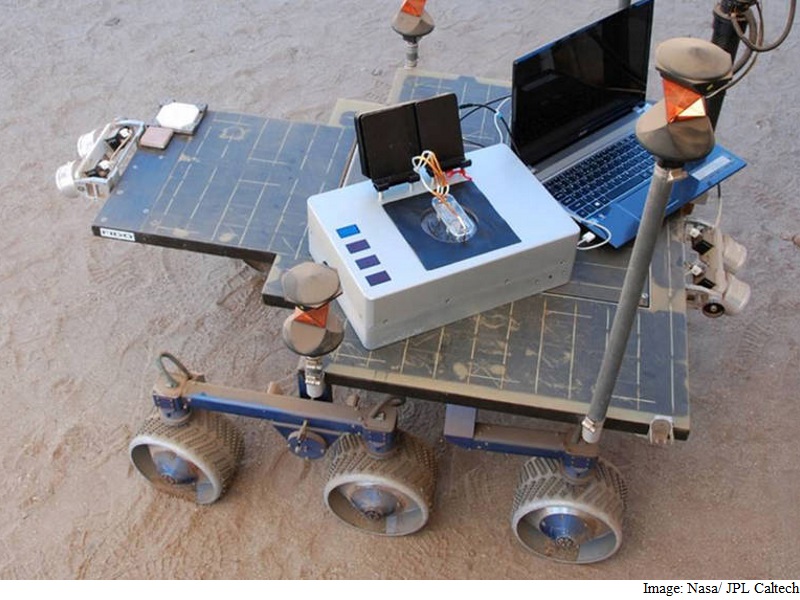- Home
- Science
- Science News
- Nasa to Develop 'Chemical Laptop' to Aid Search for Alien Life
Nasa to Develop 'Chemical Laptop' to Aid Search for Alien Life

Being developed at Nasa's Jet Propulsion Laboratory (JPL) in Pasadena, California, the device will help astronauts look for the signatures of life on another world, including Mars.
"If this instrument were to be sent to space, it would be the most sensitive device of its kind to leave the Earth and the first to be able to look for both amino acids and fatty acids - the building blocks of life," said Jessica Creamer, Nasa post-doctoral fellow based at JPL.
The "Chemical Laptop" is a on-the-go laboratory which researchers hope to send one day to another planetary body such as Mars or Europa.
It is roughly the size of a regular computing laptop, but much thicker to make room for chemical analysis components inside.
But unlike a tricorder seen in the movie "Star Trek," it has to ingest a sample to analyse it.
"Our device is a chemical analyser that can be reprogrammed like a laptop to perform different functions," added Fernanda Mora, a JPL technologist.
As on a regular laptop, we have different apps for different analyses like amino acids and fatty acids, he added.
Amino acids are building blocks of proteins, while fatty acids are key components of cell membranes.
Both are essential to life, but can also be found in non-life sources and the "Chemical Laptop" may be able to tell the difference.
If a test found a 50-50 mixture of left-handed and right-handed amino acids, we could conclude that the sample was probably not of biological origin.
"But if we were to find an excess of either left or right, that would be the golden ticket. That would be the best evidence so far that life exists on other planets," Creamer noted.
When the laptop is set to look for fatty acids, scientists are most interested in the length of the acids' carbon chain. This is an indication of what organisms are or were present.
Coming up is a test in the Atacama Desert in Chile, with collaboration from Nasa's Ames Research Center, Moffett Field, California.
"This could also be an especially useful tool for icy-worlds targets such as Enceladus and Europa. All you would need to do is melt a little bit of the ice, and you could sample it and analyze it directly," Creamer explained.
The "Chemical Laptop" technology has applications for Earth, too.
It could be used for environmental monitoring analysing samples directly in the field, rather than taking them back to a laboratory.
Uses for medicine could include testing whether the contents of drugs are legitimate or counterfeit, the statement added.
For the latest tech news and reviews, follow Gadgets 360 on X, Facebook, WhatsApp, Threads and Google News. For the latest videos on gadgets and tech, subscribe to our YouTube channel. If you want to know everything about top influencers, follow our in-house Who'sThat360 on Instagram and YouTube.
Related Stories
- Samsung Galaxy Unpacked 2025
- ChatGPT
- Redmi Note 14 Pro+
- iPhone 16
- Apple Vision Pro
- Oneplus 12
- OnePlus Nord CE 3 Lite 5G
- iPhone 13
- Xiaomi 14 Pro
- Oppo Find N3
- Tecno Spark Go (2023)
- Realme V30
- Best Phones Under 25000
- Samsung Galaxy S24 Series
- Cryptocurrency
- iQoo 12
- Samsung Galaxy S24 Ultra
- Giottus
- Samsung Galaxy Z Flip 5
- Apple 'Scary Fast'
- Housefull 5
- GoPro Hero 12 Black Review
- Invincible Season 2
- JioGlass
- HD Ready TV
- Laptop Under 50000
- Smartwatch Under 10000
- Latest Mobile Phones
- Compare Phones
- Redmi Turbo 4
- Vivo Y200+
- Lava Yuva 2 5G
- OnePlus Ace 5
- OnePlus Ace 5 Pro
- Oppo A5 Pro 5G
- Vivo Y29 5G
- Honor Magic 7 RSR Porsche Design
- Asus Zenbook S 14
- MacBook Pro 16-inch (M4 Max, 2024)
- Honor Pad X9 Pro
- Honor Pad V9
- boAt Enigma Gem
- boAt Enigma Daze
- Sony 65 Inches Ultra HD (4K) LED Smart TV (KD-65X74L)
- TCL 55 Inches Ultra HD (4K) LED Smart TV (55C61B)
- Sony PlayStation 5 Pro
- Sony PlayStation 5 Slim Digital Edition
- Blue Star 1.5 Ton 3 Star Inverter Split AC (IC318DNUHC)
- Blue Star 1.5 Ton 3 Star Inverter Split AC (IA318VKU)

















